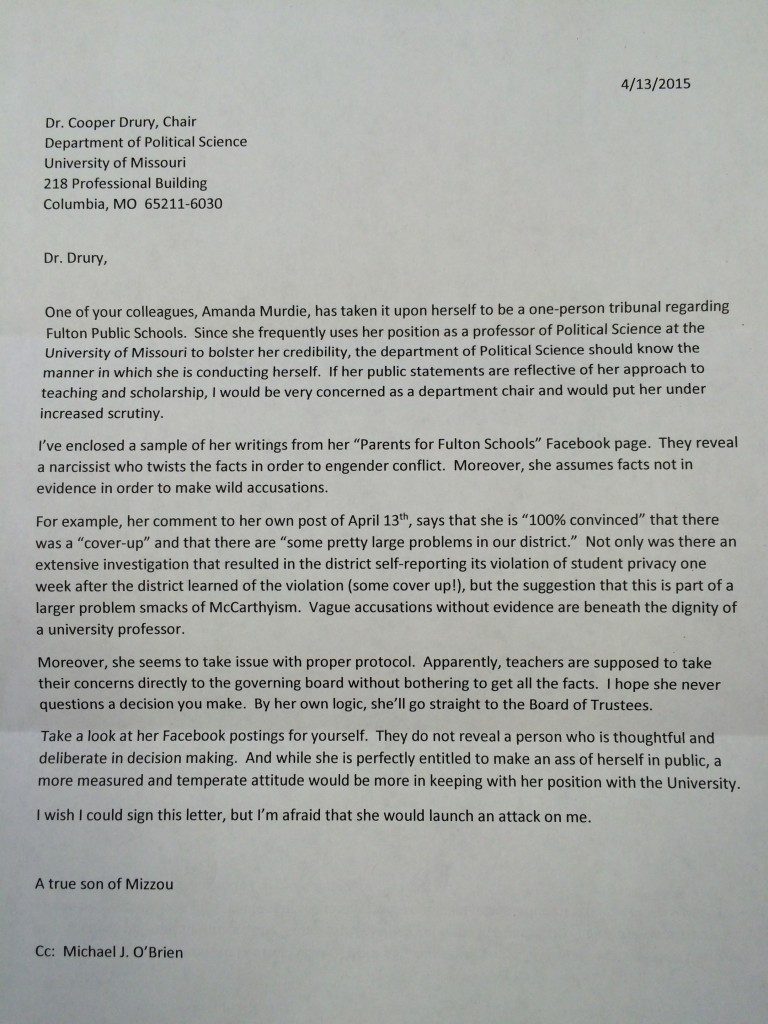On Thursday, I became part of a growing group of academics that has had a letter like this written about them:
As a parent, I’ve been doing some advocacy about my children’s school this year. The advocacy received some local media attention recently when my children’s District Administration tried to defend an activity that violated federal privacy rights.
Luckily, I’m in a department where, instead of encouraging me to be silent, senior faculty advised me to frame the letter and include it in my annual evaluation under “service.” I love my university and I love the fact that I’m still allowed to have personal beliefs and speak out about these ideas in a transparent way.
Beyond my case, a letter like this brings up larger issues that about the ability of academics to speak up for things they believe in. And, as Rob Jenkins remarked in a recent Chronicle opinion piece, “academic freedom is taking a beating.” He goes on to say:
“But what is even more endangered, it seems to me, is the right of faculty members to speak their mind outside of the classroom, off-campus, and apart from their contractual duties. In return for a paycheck, faculty members are increasingly expected to surrender their personal beliefs on controversial topics, lest—God forbid—they say something that might “embarrass the institution.”
That, I would argue, is an attempt to suppress free speech.”
Would a letter like this have been written to my employer if I wasn’t an academic? I’m not sure it would have been. The unnamed “Son of Mizzou” who wrote that letter seems to imply that I need to be “more measured and temperate” in my personal dealings due to my professional job. However, as an academic, I feel it is my duty to protect diverse ideas and opinions and be open to transparent debate about these ideas, whether they occur in my professional or personal life.
I stand by everything I have said, posted, tweeted, and written in advocating for my children this year. Moreover, I stand by the right of all us to speak up for things we believe in, whether we are academics or not.
Amanda Murdie is Professor & Dean Rusk Scholar of International Relations in the Department of International Affairs in the School of Public and International Affairs at the University of Georgia. She is the author of Help or Harm: The Human Security Effects of International NGOs (Stanford, 2014). Her main research interests include non-state actors, and human rights and human security.
When not blogging, Amanda enjoys hanging out with her two pre-teen daughters (as long as she can keep them away from their cell phones) and her fabulous significant other.



My previous job in Kazakhstan sometimes wouldn’t allow faculty to identify themselves as employees of the university when commenting to the media (unless the whole thing was approved by administration in advance). Perhaps the true son of Mizzou would be happier living in a place with a -6 polity score?
I work in tech and had a similar sort of letter sent to my workplace by a conservative journalist for owning a website that specialises in critiquing a certain London politician.
I think the author is (unjustifiably) more annoyed at your confidence and style than the substance. The letter seems really about tsk tsk-ing you and telling you that you aren’t acting ‘proper’ PLUS that you seem to be acting improper with confidence. Do you think this may be influenced by gender? Do you think men get as many of these sorts of shame/discipline letters/comments?
You are so fearsome Amanda! The true son couldn’t bring himself to reveal his identity lest you launch a devastating broadside from which one assumes he would not recover. Can I just say in the next FPA showdown I’m on your side.
Bravo to you for standing fast and for exposing a ridiculous (and internally contradictory) effort to intimidate.
My reading of “the true son of mizzou” is that “he” laments how free speech contends with protocol and context. Add to this, “his” reluctance to come out of the shadows because someone might attack his views and I would recommend Mizzou find better sons.
Jonathan,
What you experienced in Kazakhstan I have experienced in my current job, in St. Louis! Academic freedom really is under siege right now.
Davis
I am surprised no one has yet commented on the irony: An anonymous accuser (presumably in a minor position of power with the school board) tries to get a professor fired for expressing political opinions, yet it is the anonymous accuser who claims that the situation “smacks of McCarthyism.”